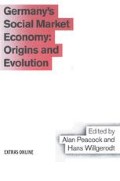Abstract
In stating that economically under-developed countries can initiate and maintain a process of development only by means of extensive governmental economic planning (in the sense of a centrally-controlled economy) Gunnar Myrdal has given expression to a very widespread conviction.1 It should be made clear that Professor Myrdal’s statement concerns not only the planning of the so-called infrastructure, which must be planned in any economic system, but the use of productive resources in general. It is for discussion whether the state should determine the use of these resources by means of direct control.
Access this chapter
Tax calculation will be finalised at checkout
Purchases are for personal use only
Preview
Unable to display preview. Download preview PDF.
Notes and References
Gunnar Myrdal, Economic Theory and Under-developed Regions (London: Gerald Duckworth, 1957) p. 79.
The contribution of the state to development has been traced in Werner Sombart, Der Moderne Kapitalismus, 2nd edn (Munich and Leipzig: Duncker & Humblot, 1916); and
Eli F. Heckscher, Der Merkantilismus (Jena: Gustav Fischer, 1932).
Joseph Schumpeter, ‘Das Sozialprodukt und die Rechenpfennige, Glossen und Beiträge zur Geldtheorie von heute’, in Archiv für Sozialwissenschaft und Sozialpolitik, Tübingen, Vol. 44, 1917–18, p. 627.
Fritz W. Meyer, ‘Geldpolitik, Vollbeschäftigung und Wirtschaftsordnung’, in Ordo, Vol. 1, 1948, p. 91.
Reinhold Biskup, ‘Die Sowjetische Wirtschaftshilf an Entwicklungsländer im Vergleich zur Hilfeistung der freien Welt’, in Wirtschaftspolitische Chronik, publication 2/3 (Cologne: Institut für Wirtschaftspolitik an der Universität zu Köln, 1959) p. 63.
Peter T. Bauer, ‘International Economic Development’, in Economic Journal, Cambridge, Vol. LXIX, 1959, p. 105. For fundamental questions of development aid see
Bauer, Economic Analysis and Policy in Under-developed Countries (London: Duke University Press, 1957);
Bauer and Basil S. Yamey, The Economics of Under-developed Countries (London: Nisbet, 1957); and
Bauer, United States Aid and Indian Economic Development (Washington: American Enterprise Association, 1959).
Editor information
Editors and Affiliations
Copyright information
© 1989 Trade Policy Research Centre
About this chapter
Cite this chapter
Meyer, F.W. (1989). Development Aid in a Free Market System. In: Peacock, A., Willgerodt, H. (eds) Germany’s Social Market Economy: Origins and Evolution. Trade Policy Research Centre. Palgrave Macmillan, London. https://doi.org/10.1007/978-1-349-20145-7_16
Download citation
DOI: https://doi.org/10.1007/978-1-349-20145-7_16
Publisher Name: Palgrave Macmillan, London
Print ISBN: 978-1-349-20147-1
Online ISBN: 978-1-349-20145-7
eBook Packages: Palgrave Economics & Finance CollectionEconomics and Finance (R0)

